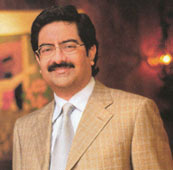Leadership in the times of crisis: Riding commodity cycles
04 May, 2009 | Businessworld
ShareBusinessworld
4 May 2009
Aditya Birla Group has ridden its commodity cycles smartly
 Between aluminium and copper, the Rs. 140,000-crore ($28-billion) Aditya Birla Group lives off two of the world's most sought after, hence, volatile commodities. It was the earliest among Indian groups with a global view of business, with plants across the globe even a decade and a half ago. Yet, it has gone on an acquisition overdrive since 2000, picking up as many as 15 companies. But the downturn has come to haunt the Group that earns a majority of its revenues from commodities. Businessworld's Rajeev Dubey and Muthukumar Kailasam met the Group Chairman, Mr. Kumar Mangalam Birla to ask how he rides the commodity cycles in tough times. Excerpts:
Between aluminium and copper, the Rs. 140,000-crore ($28-billion) Aditya Birla Group lives off two of the world's most sought after, hence, volatile commodities. It was the earliest among Indian groups with a global view of business, with plants across the globe even a decade and a half ago. Yet, it has gone on an acquisition overdrive since 2000, picking up as many as 15 companies. But the downturn has come to haunt the Group that earns a majority of its revenues from commodities. Businessworld's Rajeev Dubey and Muthukumar Kailasam met the Group Chairman, Mr. Kumar Mangalam Birla to ask how he rides the commodity cycles in tough times. Excerpts:
What is the fundamental philosophy that guides your handling of the commodity cycles that play such critical role in the business of your Group?
Inherently, every commodity goes through cycles of growth and de-growth. That is something you have to live with. You have to become the lowest cost producer, so that you are least affected or the last person to be affected.
Second, you move down the value chain and keep moving closer to the customer, getting into value-added products to the extent possible. That reduces the cyclicality to an extent.
These are the only two things you can do to mitigate the impact of commodity cycles, besides, of course, quality and customer service.
There are different theories on how to ride the cycles. There is the stick-to-the-knitting theory, and there is the lateral integration theory. You seem to be going the integration way...
Integration makes sense in most cases.
I can't say if it works across industries, but in most cases it makes sense. Stick(ing) to the knitting — I don't think it is a good idea for India. The country is in a stage of evolution where many sectors are opening up that were earlier not open to private participation. Sectors such as insurance and telecom. If you stick to the knitting, then you are shutting off opportunities. Take retail, for example. No one has expertise in that area. So by that logic, no one should have invested in retail.
Sticking to the knitting would probably apply to a developed economy where there is low growth. In our case, it is very much an economy that is in an evolutionary phase, where new industries and opportunities are available to the private sector.
Lateral integration had not been the practice till recently. But in these times, it seems to be gaining acceptance.In a sense, it gives you greater control of your destiny.
This, of course, was part of the strategy behind your largest acquisition — Novelis. It faced quite a bit of criticism, but why did you remain silent?
It is simple logic. Like I said, for a commodity, it is important to get into a value-added segment — that is a much more consistent and less cyclical business. Novelis has the largest downstream play for numerous rolled products, and it is the leader in all except for one. Plus, it has a very high level of competence in its manpower.
In the medium to long-term point of view, it was very important for Hindalco to acquire. You could question it by saying that you paid a little less for it, or you paid more for it. All of that one has to take into account on a long-term perspective. Sometimes, shareholders' views may not exactly be similar to the views of the management. An acquisition of this size cannot get accretive in one year. Also, I think we are not yet used to such big acquisitions. So, it takes time to understand the complexities, and to get used to it. We have to see (it) from the point of whether it is an asset that is adding value in the long term.
Given the fact that commodity cycle is now down, when will Novelis deliver shareholder value?
If we knew that commodity cycles would go down, then we would have paid less. No one knew about it. Having said that, the long-term value remains the same. We had said from the beginning that it will be value accretive in three years. After this cycle, it may be value accretive in four years. So, there is another three years to go. Which, for an acquisition of this size, is quite reasonable.
To what extent has Novelis been hit by auto sales d;rop in the US and Europe?
It has been (affected) because of d;rop in sales in both auto and construction.
And how is it countering it?
By providing technical services to customers and by customising aluminium. That's the way to counter this downturn to an extent.
Where do the acquisitions of copper mine figure in this strategy?
We are mapping and looking around for mining. It has to suit our requirement in terms of size, location, etc. Such acquisitions will give us better control over scarce resource.
Is it tougher to manage commodity cycles from India or from abroad?
When you are abroad, you are more prone, face more direct and fierce global competition. So, in that way, it is much more difficult managing them.
Commodity businesses are prone to dumping. How should it be handled?
The government has to be quicker in implementing safeguard duties against dumping. Other governments are faster. We are not asking for protectionism, but just cooperation in these special circumstances like every other developed country.
Economic nationalism is gaining ground across the world as the global slowdown worsens. To what extent does it hurt commodity businesses?
Yes, this is already happening. I think we are beginning to see the bottom, and we should be able to recover to a large extent by the end of the second quarter. I think recovery would be very sharp in India.
But are nationalistic concerns hurting a Group such as yours that works across geographies?
It does hurt. But it is very important for us as a country to be alert in such situations and have a strategy to tackle them.
The changes in your Group profile over the years suggest that you are looking at a balancing factor against commodities. Is that a conscious decision or one led by opportunities?
It is a conscious decision to have a part of the portfolio that is asset light. It is not opportunity-led; that happened by design.
 Are you looking at more non-commodity sectors to balance the commodity bias of the Group?
Are you looking at more non-commodity sectors to balance the commodity bias of the Group?
We have a presence in financial services, BPO and telecom. We are not looking to invest in sectors beyond this as of now.
What is the strategy behind the acceleration in M&;As? Are you consciously taking more risks?
I think so, because the risk of capital for the industry as a whole has changed. Industries in India, particularly, are in the consolidation stage, more so than they have been in the past. The fundamentals are stronger as companies have grown and that gives them the ability to acquire. So it is both — companies have become larger and financially stronger.
And how much of it had to do with, let us say, the capital that was available?
One, it was readily available, and it was also supposedly cheaper than in the past. And also, as companies became stronger and financially more robust, I think the appetite for acquisitions and risks becomes larger.
How has the Novelis acquisition changed your view of things? Does it makes sense to do business in India or does it make sense to look abroad?
Again it depends on the quality of asset. For example, if I want pulp for viscose fibre, Canada has the best wood and the best quality of pulp, that's why we acquired it there. There is no comparable wood here in India. In the case of Novelis, there is no comparable company here in India or anywhere in the world. So, it is asset specific.
But say, you had cash in hand and you want to deploy it. Would your destination be India? Many people believe now that India is too expensive for investment...
I won't say that. I think you have to take a sectoral approach and see how it works for each sector.
Your Group has grown in the last fiscal, but profit has dipped. How do you plan to bounce back?
Through productivity improvements and cost rationalisation. For commodity business these are the two basic levers that one would work on, which we are doing.
Any immediate plans to retire debt?
Not as of now, I think it is the time to preserve liquidity.






